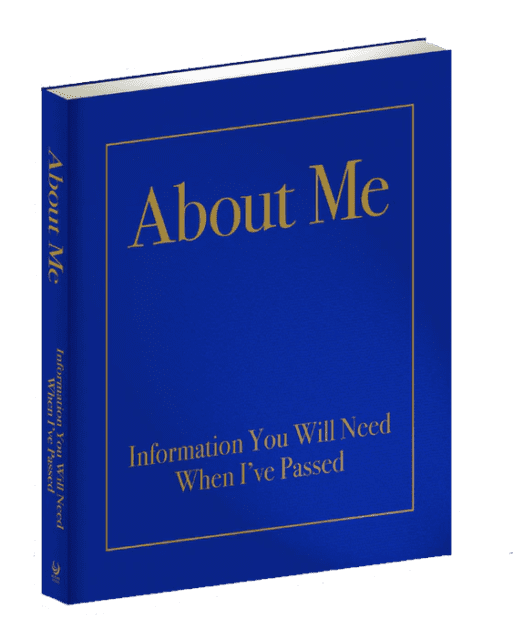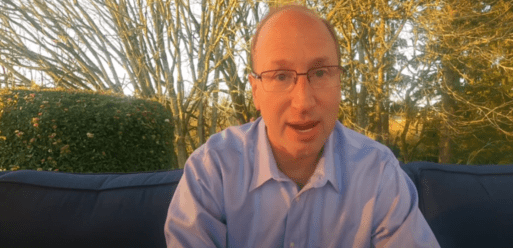
Robert Kabacy is an estate planning attorney in Portland, Oregon
Upon losing his mother two decades ago, Robert Kabacy, an estate attorney practicing in Portland, Oregon, created a resource entitled “About Me” to accompany a traditional estate plan. This easy, straightforward guide and workbook is intended for the reader to capture the practical details of a life (e.g., passwords, bank accounts, etc.) so that all affairs are completely in order for the bereaved. SevenPonds recently sat down with Robert to learn more about his helpful resource.
Editor’s note: This interview has been edited for length and clarity
I understand that your mom’s passing in 2002 prompted the writing of this book. Would you mind talking a little bit more about that, please?
Sure. A little over 20 years ago, my mother was diagnosed with cancer and told me about it. It was stage four, and would be terminal, which is devastating when you hear news like that. Being an estate planner at the time, [I was asked] to do her will and get everything in order, which I dutifully did.
But there was a lot of practical stuff that I didn’t know about her (like who her friend base was, passwords for things that she had going on, and where her finances were). I realized that I didn’t have that practical information, and so I spent quite a bit of time with her getting it recorded into a little three-ring binder. She helped with it as well with some personal information and notes. What I did then was set it aside with the estate plan and enjoyed what little time left we had with her.
When we got the call one day that she had died, I was not there, but I showed up about half an hour later, and of course, I was named as the executor, and shortly thereafter started the administration process.
But what I didn’t realize was the brain fog that sets in with grief. And even though I was a trained lawyer who should know exactly what to do at each step of the way, I was just emotionally overwhelmed. Fortunately, I had the legal estate plan in order.
I had my little three-ring binder with all the practical information, and it did two things:
it put everything that I needed at my fingertips in one spot and kind of helped me through an automatic administration in that brain fog area. The second thing it did was that it made me feel like I had some control in an uncontrollable environment.
Having experienced it firsthand, I realized that, Gee, if I’m having all this trouble and struggling with it, how is the rest of the world getting along with this? And are people forgetting to tell others how to get into their cell phones, and how to shut off automatic bill pay, and what they want at their funeral, and all the personal information that makes us unique? How is that information being communicated?
I put together this compendium and got it published. I found that it’s made a lot of lives a whole lot easier, starting with my own.

A comprehensive resource to capture all of life’s little details.
How has your experience as a lawyer who specializes in estate planning influenced this book? What added features could a reader expect?
What I’ve tried to do with this book is a couple of things: First, I wanted to make it customizable, so that people could convey their own unique information about themselves to their loved ones. That’s why the first part of the book is customizable with all the questions you need to ask.
The second thing I wanted to do is convey some information in very simple, easy-to-understand language about the administration process. How does it work? What is probate? How are taxes involved? How to handle a dispute? How to handle grief?
And then finally, I wanted a single organized place where the reader could find websites, telephone numbers, and resources. That’s all contained in the third part of the book along with a bunch of blank pages where you can write personal letters to those you’re leaving behind. It’s a one-stop shop that gives you everything you need, and so you don’t have to go searching. It’s kind of like having the treasure map right there without having to go on a long expedition during the administration process, which really is not the time to do a long expedition or discovery of information.
In this book, I read that more than 70% of people have done no estate planning. That’s a staggering statistic. Why, do you think that is?
I’ve studied this, and I have a theory about it. My theory goes as follows: As human beings there are two things that we all share: one, we’re born and two, we die. Everything that happens in between our birth and our death is the color and the differences that make us unique.
As individuals and as people, the birth component of commonality between human beings is a celebration: it’s the entrance of life; it’s a happy event. People party, they celebrate, they get together, they enjoy, it’s fun.
On the other hand, we correlate death with blackness and loss and grieving, and so we don’t like that. As a result, our natural egos sort of try to avoid the concept of death, and especially our own death. That we have to stay alive and to address our own death means that we have to face that we are going to die one day, and we don’t like that thought of not being here. That’s just a function of who we are and the survival instinct.
I think seven out of 10 people probably know they should do something, but they don’t get around to it for several reasons: 1) there’s a million other fun things in the world to do other than estate planning (so we get distracted); 2) let’s be honest – we don’t want to face grief or loss, so we tend to procrastinate number; 3) we may not think we need it, so we don’t get around to it; 4) some of us might not care about it. We’re dead. What does it matter?
Estate planning is really a gift that you leave behind for you loved ones so that they have an easier time handling the administration. You can minimize tax. You can give information that makes the process much faster and maybe take some of the sting away, because the process is smoother.
It’s not an answer to grief, but planning helps people get through the grieving process.

Robert Kabacy talks about how an estate plan can help ease the burden of grief
How long would it take for someone to fill out “About Me?” Do you recommend doing it in one session or several?
A great question. There are people out there who can to sit down in an evening and fill out the whole book, and we’d be very happy about it. But taking it in small chunks is a better way to approach it, and that is maybe take five minutes a day for 10 days, and fill out two pages at a time, and at the end of 10 days to see where you’re at. The most important thing about filling out this book is to try not to get overwhelmed with it. When you receive it, look through it. Let your brain process what information is being requested, and then take it in small chunks. So procrastination does not set in, it would be easy to set aside and say, “Well, I’ll just get to this tomorrow. I’ll get it to it tomorrow” And guess what? Tomorrow never comes. So at least filling out a couple of pages a day, and setting a goal for yourself would be very important to do.
How often should it be updated?
It’s a good idea to update an estate plan about every three to five years if there’s a change of intent, a change of circumstances, or a change in the law. It would be a good idea to just thumb through “About Me” once a year, and update it if there’s a major event change like friendships, a falling out with someone, moving, or something like that.
I sometimes joke that you should fill out the book in pen, and when it comes time to update it, just buy another one. But the reality is, you can cross things out and update it, because again, this isn’t the legal document; this is just the practical intent for some of the information that you want your executor and loved ones to know about you.
How could getting one’s affairs in order and having a plan affect grieving survivors?
It can have a big effect on the grieving survivors in several aspects. The first aspect is you let your intent be known through legal documents. If you don’t have a plan, and you don’t have this book, then the state will do the plan for you.
I had a client one time who told me about using “About Me.” They still have it, and they said that, out of all of the things that were left behind by their mom, the book has been the most important because she had written several letters to them in the back of the book. Those letters have been more important than the bank accounts or the other things she left behind, so it’s a tangible remembrance for somebody.
The other thing it does is that it gives grieving survivors a plan and instructions on what to do, so that they can just that focus on their grief. They can remember you, work through the grieving process, and rely on each other instead of spending all of their time trying to find out how to get into your phone, who to contact, and avoid surprises six months down the road.
It can help bring closure faster whereas not having a plan (or this book) would extend the process.
How can readers get in touch with you?
Robertkabacy.com is a good place to get in touch with me. My email is bob@robertkabacy.com.
You can also find the book on Amazon.com beyondwords, barnesandnoble.com, and indiebound.com.

 Estate Planning: A Gift to Those Left Behind
Estate Planning: A Gift to Those Left Behind


 National Donate Life Month Reminds Us To Give
National Donate Life Month Reminds Us To Give
 How Dare You Die Now!
How Dare You Die Now!
 Debating Medical Aid in Dying
Debating Medical Aid in Dying














